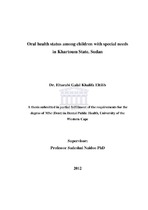| dc.contributor.advisor | Naidoo, Sudeshni | |
| dc.contributor.author | Eltilib, Elturabi Galal Khalifa | |
| dc.date.accessioned | 2014-06-20T10:27:08Z | |
| dc.date.available | 2014-06-20T10:27:08Z | |
| dc.date.issued | 2012 | |
| dc.identifier.uri | http://hdl.handle.net/11394/3388 | |
| dc.description | Magister Scientiae Dentium - MSc(Dent) | en_US |
| dc.description.abstract | Introduction: Children with disabilities and other special needs present unique
challenges for oral health professionals in the planning and execution of dental
treatment. The oral health of children with special health care needs is influenced by
various socio-demographic factors, including their living conditions and severity of the
impairment. According to United States (US) Maternal and Child Health Bureau,
special health care needs (SHCN) children are defined as “those who have or are at
increased risk for a chronic physical, developmental, behavioral, or emotional condition
and who also require health and related services of a type or amount beyond that
required by children generally”. Aim and Objectives: The aim was to determine the oral health status of children with special needs. The objectives were to determine the prevalence of dental caries, periodontal disease and oral mucosal lesions among children with special needs in Khartoum State aged 5 to 15 years old attending educational and rehabilitation institutions. Methodology: A descriptive cross–sectional study was carried out. Data were collected with a data capture sheet that was a modified WHO Oral Health Assessment Clinical Oral Examination Guideline. Demographic variables, dmft, periodontal disease and oral mucosal lesions were recorded. Results: The mean dmft /DMFT scores was 2.02/1.25. The DMFT score increased with age, girls showed higher score than boys and autistic children had the poorest oral health among other disabilities. More than two third of the examined sextants were healthy, less than quarter had bleeding (18.3%) and 5% calculus accumulation. Fissured tongue was the most frequent oral lesion found. Conclusion: Children with special needs in Khartoum State demonstrated a high prevalence of dental caries and periodontal disease and do not receive adequate dental care. There is an urgent need for both preventive and treatment programmes to improve the oral health of children with special needs. | en_US |
| dc.language.iso | en | en_US |
| dc.publisher | University of Western Cape | en_US |
| dc.subject | Children with special needs | en_US |
| dc.subject | Oral health status | en_US |
| dc.subject | Khartoum State | en_US |
| dc.subject | Sudan | en_US |
| dc.title | Oral health status among children with special needs in Khartoum State, Sudan | en_US |
| dc.rights.holder | University of Western Cape | en_US |

